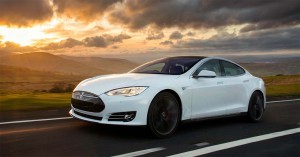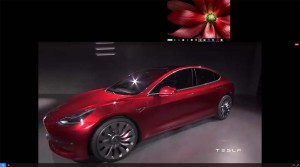
All Tesla models going forward will be capable of fully autonomous driving once regulatory approvals happen.
The race to be the first automaker to produce a fully autonomous vehicle is over … according to Tesla’s Elon Musk anyway.
Effective immediately, all Teslas rolling off the production line are being equipped to be fully self-driving, including the maker’s first entry-level sedan, the Model 3, when it goes into production late next year, the CEO noted.
Musk, who delayed the announcement by two days, said the vehicles are capable of Level 5 autonomy, which means they are able drive in all environments and traffic conditions. The advancement is due to a bulked up package of cameras, sensors and other equipment Musk labeled “Hardware Two.”
For example, the new vehicles now use eight cameras instead of the single camera it used before. Eight surround cameras provide 360 degrees of visibility around the car at up to 250 meters of range. Twelve updated ultrasonic sensors complement this vision, allowing for detection of both hard and soft objects at nearly twice the distance of the prior system, the company notes.
(Surprise! All new Tesla models fully autonomous. Click Herefor the story.)

Tesla CEO Elon Musk said even the Model 3 will be capable of self-driving when it hits the road late next year.
While the technology on each model is capable of full autonomy, there are no regulatory approvals in place allowing the vehicles to operate in that mode. Musk is unsure when those approvals will come, but he’s confident in the new set up.
Not only do Teslas come with more cameras, sensors and improved sonar, the computing power to drive all the systems has been up 40 times.
“It’s like driving with a supercomputer on board,” he said.
In the meantime, the current models with Autopilot – using the equipment level termed “Hardware One” – are actually more autonomous than the new vehicles rolling off the line with Hardware Two.
However, Musk noted that will even out as regulatory approvals give the new models more freedom to use the technology at a level that Musk describes as Enhanced Autopilot.
(Tesla warns of slow Model 3 deliveries. For more, Click Here.)
The next-level Autopilot will match speed to traffic conditions, keep within a lane, automatically change lanes without requiring driver input, transition from one freeway to another, exit the freeway when owners near their destination, self-park when near a parking spot and be summoned to and from a garage.
Tesla’s Enhanced Autopilot software is expected to complete validation and be rolled out via an over-the-air update in December 2016, subject to regulatory approval. He warned that people should not confuse Enhanced Autopilot with autonomous driving.
He noted that the capability he laid out for the enhanced model isn’t “self-driving.” He said the company called it Autopilot because it’s modeled on the same program used on airplanes, which doesn’t allow large planes to fly themselves.
Additionally, Musk took the chance to lobby for the use of autonomous vehicles saying that the safety level of the fully autonomous vehicle is “twice that of a person, maybe better. I think that it’s unexpected by most people.”
To prove that point, he’s planning to drive from Los Angeles to New York City sometime next year. The trip will be done completely by the vehicle: leaving California, recharging at superchargers, pulling into Times Square to let Musk out of the car, and then leaving to find a parking spot.
(Tesla, Panasonic teaming up to produce solar cells. Click Here for the news.)
However, the end-goal is for Teslas to be 10x better than human drivers, which Musk believes is achievable as the system continues to improve and updates are sent out every two or three months, he noted.

It’s like Schroedinger’s autonomy. No one really knows what’s in the bo
It’s like Schroedinger’s autonomy. No one really knows what’s in the box